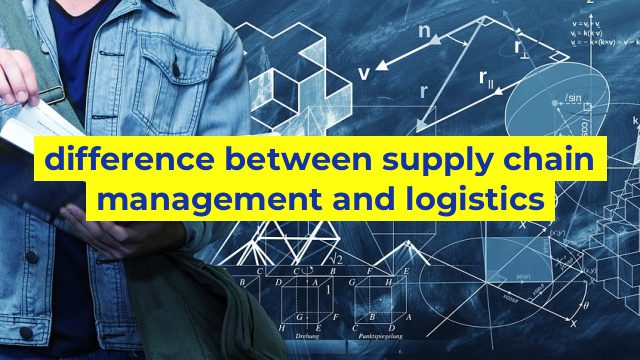Understanding the difference between supply chain management and logistics
Supply chain management and logistics are two terms that are often used interchangeably. While both are essential components of any business that deals with the movement of goods and materials, they have distinct differences.
Supply chain management
Supply chain management is the process of overseeing and coordinating all activities involved in the creation and delivery of a product or service, from the supplier to the end consumer. It includes everything from sourcing raw materials to production, warehousing, distribution, and delivery. The ultimate goal of supply chain management is to ensure that the right product is delivered to the right place at the right time and at the lowest possible cost.
Effective supply chain management requires collaboration between various stakeholders such as suppliers, manufacturers, distributors, and retailers. It typically involves a series of interconnected processes that require close monitoring and coordination to ensure that every step is executed efficiently.
Logistics
Logistics, on the other hand, is a subset of supply chain management that focuses on the physical movement and storage of goods. It refers to the transportation of goods to the desired destination at the right time and in the right condition.
Logistics includes activities such as transportation, warehousing, inventory management, and packaging. It is essential for businesses to have an efficient logistics system to ensure that products reach their destination on time and in good condition. Logistics also plays a crucial role in reducing costs and improving customer satisfaction.
Their relation
While supply chain management and logistics are different, they are closely related. Effective supply chain management requires efficient logistics systems to ensure that products are delivered to their destination on time and in good condition. Logistics, in turn, impacts every aspect of the supply chain, including production, inventory management, and customer satisfaction.
In conclusion, supply chain management and logistics are both critical components of any business that deals with the movement of goods and materials. While they have distinct differences, they are interrelated and work together to ensure that products are delivered to their destination efficiently and cost-effectively. Understanding the difference between the two is essential for businesses to develop effective strategies for managing their supply chain operations.
Table difference between supply chain management and logistics
| Supply Chain Management | Logistics |
|---|---|
| Focuses on the entire process from raw materials to the final product | Focuses on the transportation and storage of products |
| Involves all activities related to planning, sourcing, producing, and delivering the product to the end customer | Covers only the movement and storage of goods from one point to another |
| Includes managing supplier relationships, inventory levels, production schedules, and distribution channels | Includes managing transportation, warehousing, and delivery activities |
| Strives to reduce costs, improve quality, and increase customer satisfaction | Focuses on optimizing transportation routes, reducing delivery times, and minimizing inventory costs |
| Requires collaboration with internal and external stakeholders, such as suppliers, manufacturers, distributors, and customers | Requires close coordination with carriers, freight forwarders, and warehouse operators |

